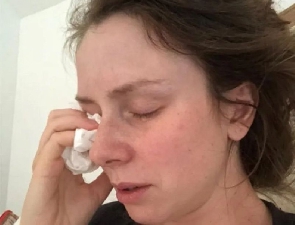 Susie Verrill no fit leave her bedroom for five months anytime she get belle sake of sickness
Susie Verrill no fit leave her bedroom for five months anytime she get belle sake of sickness
Scientists say dem don discover why some women dey dey extremely sick during pregnancy, and dis don bring dem one step closer to possible cure.
Babies dey produce hormone wey fit cause serious sickness, wey dem dey call hyperemesis gravidarum (HG), according to one study.
Exposure to GDF15 hormone before pregnancy fit be new treatment.
Prof Sir Stephen O'Rahilly, from University of Cambridge, say: "Di more sensitive wey a mother dey to di hormone, di more sho go sick."
Im add: "To sabi dis don give us clue to how we fit prevent dis from happening."
Between one and three out of 100 pregnancies dey dey affected by HG.
E fit threaten life of di unborn pikin and many women need intravenous injection for hospital to prevent dehydration.
Some mothers bin report ssay dem dey sick up to 50 times a day throughout dia pregnancies.
Susie Verrill, 35, wey dey engaged to Olympian Greg Rutherford, say her experience of HG bin dey traumatic, e make her wan remove di belle.
Di mother of three, wey dey live for Woburn Sands, Buckinghamshire, bin get HG for two out of her three pregnancies and women wey dey suffering from am every day bin dey contact her.
"I bin get real sense of inability to exist, I bin no fit dey around my family," she say. "I bin consider to remove my pregnancies becos e bin dey so terrible and dat really common when you get HG.
"I bin no fit breathe witout vomiting and I bin remain for my bedroom for five months di two times. You have to make your world very small to survive and Greg became my carer.
"E dey affect everytin and you just dey try to get through each day before you born di pikin."
Studies wey sabi pipo do before suggest say pregnancy sickness fit relate to GDF15 but researchers said di "full mechanistic understanding" dey "lack".
Di new research, wey dem publish for Nature and wey involve scientists for University of Cambridge and researchers for Scotland, USA and Sri Lanka, find say di degree of sickness dey related to di amount of hormone wey woman dey produce for her womb - and before di pregnancy.
Dem study women for di Rosie Maternity Hospital for Cambridge and find say pipo wey get one genetic variant dey face greater risk of HG, dem get lower levels of di hormone, while women wit di blood disorder beta thalassemia, wey dey cause very high levels of GDF15 before pregnancy, dey experience very little nausea or vomiting.
Preventing di hormone from getting access to im "highly specific receptor for di mother brain" go "ultimately form di basis for effective and safe way of treating dis disorder," Prof Sir Stephen, director of di Medical Research Council metabolic diseases unit for University of Cambridge, tok.
Mother of two Vivienne Kumar from Bedford bin sick 10 times in one hour during her pregnancies and di only time wey she no dey vomit na wen she dey sleep.
"E no just be morning sickness, e dey tire," she tok. "Once you go through am you no go ever really recover, e go stay wit you forever.
"I bin feel really shut off from di world and like I bin dey inside my own bubble. I no see di end point. E really hard to leave di house.
"I bin dey so lucky to get di support of my husband and mama, witout dem I for fit no dey motivated to continue."
Wen she become pregnant for di third time dem admit her for hospital for eight days and she later loss di baby.
"I bin dey under plenty different medications and dem give me steroids wey no work and unfortunately di pikin no survive am," she add.
Charlotte Howden, chief executive of charity Pregnancy Sickness Support, wey dey support women wit HG, say dem bin don neglect di health issue for too long.
She say: "I dey so grateful for di dedication of di researchers, becos dis no be condition wey dey really ever make headline.
"E bin no be area of research wey pipo really dey interested in. E bin just be morning sickness - why we go care?"